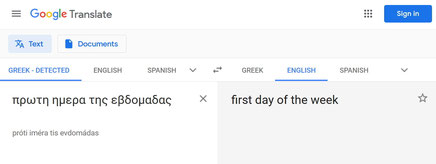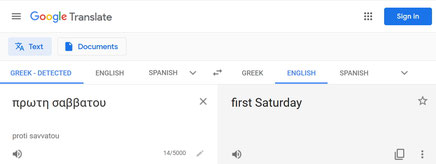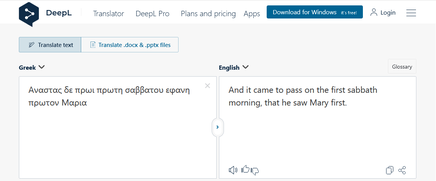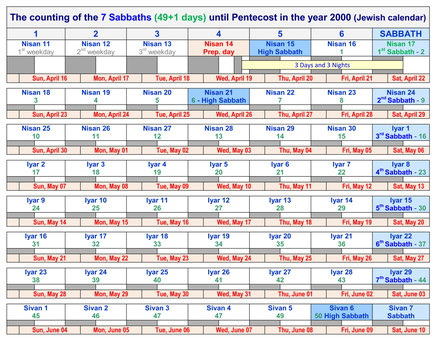- Home
- English
- Structure of the Bible
- Structure of the Menorah
- Ancient Menorahs
- Calendar and Feasts
- Resurrection on Sabbath
- Introduction
- Day
- Sabbath
- High Sabbath
- Pre-Sabbath
- Week
- Interlinear Bible
- Church Opinions
- 1. No Sunday
- 2. A Sabbath
- 3. No Friday
- 4. Intermediate Day
- 5. Three Days and Three Nights
- 6. Manipulations
- 6.1 Sabbath not Sunday
- 6.2 Plural σαββατων not week
- 6.3 one not first
- 6.5 Day of the Sabbaths
- 6.7 Lords Day
- 7. Old Bibles
- Greek Bibles
- Latin Bibles
- Gothic Bible
- English Manuscripts
- English Bible Prints 1
- English Bible Prints 2
- English Bible Prints 3
- English Bible Prints 4
- German Manuscripts
- German Bible Prints 1
- German Bible Prints 2
- Spanish Bibles
- Italian Bibles
- Swedish Bibles
- μια των σαββατων
- Mt 28-1
- Mk 16-2
- Mk 16-9
- Lk 24-1
- John 20-1
- John 20-19
- Acts 20-7
- 1Cor 16-2
- Lk 18-12
- 7 Languages
- Palm Sabbath
- Omer
- Summary
- The Rapture
- Rabbi Kaduri Note
- 666
- 888
- Video
- Info
- Historic Bibles Facsimiles
- Francais
- Deutsch
- Espanol
- Dutch
- Ελληνική
- Pусский
- Introduction
- Day
- Sabbath
- High Sabbath
- Pre-Sabbath
- Week
- Interlinear Bible
- Church Opinions
- 1. No Sunday
- 2. A Sabbath
- 3. No Friday
- 4. Intermediate Day
- 5. Three Days and Three Nights
- 6. Manipulations
- 6.1 Sabbath not Sunday
- 6.2 Plural σαββατων not week
- 6.3 one not first
- 6.5 Day of the Sabbaths
- 6.7 Lords Day
- 7. Old Bibles
- Greek Bibles
- Latin Bibles
- Gothic Bible
- English Manuscripts
- English Bible Prints 1
- English Bible Prints 2
- English Bible Prints 3
- English Bible Prints 4
- German Manuscripts
- German Bible Prints 1
- German Bible Prints 2
- Spanish Bibles
- Italian Bibles
- Swedish Bibles
- μια των σαββατων
- Mt 28-1
- Mk 16-2
- Mk 16-9
- Lk 24-1
- John 20-1
- John 20-19
- Acts 20-7
- 1Cor 16-2
- Lk 18-12
- 7 Languages
- Palm Sabbath
- Omer
- Summary
Mk 16:9 - The Resurrection of Jesus on the First Sabbath
Mk 16:9: „Now when Jesus was risen early the first day of the week, he appeared first to Mary Magdalene...“ - This is the text of the King James Bible, but the Greek basic text of the New Testament (NT) actually speaks of a Sabbath on which Jesus appeared to Mary: Below are the Greek words with pronunciation (transcription) and literal translation:
„αναστας (anastas; having risen) δε (de; but) πρωι (proi; early) πρωτη (prote; first) σαββατου (sabbatou; Sabbath) εφανη (ephane; he appeared) πρωτον (proton; first) μαρια (maria; Mary)...“
The translation is extremely simple and everyone can understand it. Possible translations are:
„But when he was risen, early on the first Sabbath, he appeared first to Mary...“ or:
„But when he rose early on the first Sabbath, he appeared first to Mary...“
Four translation errors in just one sentence
The comparison of the basic Greek text with the King James Bible proves that to support the alleged Sunday resurrection of Jesus in one sentence four serious translation errors had to be made:
1. Sabbath (σαββατου = singular, not plural) was erased from the Bible.
2. week (εβδομαδα = ebdomada) was added to the Bible.
3. day (ημερα = hemera) was added to the Bible; a new day instead of the Sabbath day.
4. Sunday (ημερα του ηλίου or ηλίου ημερα / ημερα Ήλίου = heliou hemera) was added in some modern Bibles.
The easy to understand phrase "on the first Sabbath" became "on the first day of the week" = "την πρωτη ημερα της εβδομαδας". Are you God that you can change the definition of the "Sabbath" that has existed since creation? However, there are many Bibles that have been translated correctly (see below).
Beware of a Different Gospel
The Bible teaches the gospel (the good news) of the resurrection of Jesus "early on the first Sabbath" after Passover (Nisan 15), but not "early on the first Sunday" or "early on the first day of the week" or "early after the Sabbath", as some revised or modern Bibles say, because in ancient Greek and in all other languages of the world there are always completely different words for this.
The Gospel includes not only the fact that Jesus was resurrected, but also the day of the week on which this happened.
This question is very important to God, which is why He mentions the Sabbath by name 7 times in the resurrection chapter of the NT. He did not want people to accept the Roman holiday (Sunday) of those who crucified our Lord Jesus and who follow a different calendar with completely different holidays. God did not want us to abolish His assembly days (moedim, feasts) and instead gather together with the Gentiles on their own feast days. Should it be God's will to degrade His own day of rest (Sabbath) to a preparation day (working day) for the new day of rest (Sunday) and at the same time to valorize the weekly and annual festivals of the Gentiles, while His own are forgotten by the Christians?
Why is this question so important? Through the resurrection of Jesus on a Sabbath (on His day!), He fulfilled the law in a perfect way and became our Sabbath rest. No power in the world can cut us off from this spiritual eternal rest. In Him we have everything and He is everything for us. This is why Paul warns against another gospel (Gal 1:8-9), which the basic Greek text does not recognize, because it speaks of the Sabbath exactly 70 times, but 0 times of Sunday. So think carefully about what you say and how you argue, because Jesus warned:
Mt 12:36-37: "I [Jesus] tell you, on the day of judgment people will give account for every careless word they speak, 37 for by your words you will be justified, and by your words you will be condemned."
Gal 1:6-9: "I am astonished that you are so quickly deserting him who called you in the grace of Christ and are turning to a different gospel - 7 not that there is another one, but there are some who trouble you and want to distort the gospel of Christ. 8 But even if we or an angel from heaven should preach to you a gospel contrary to the one we preached to you, let him be accursed. 9 As we have said before, so now I say again: If anyone is preaching to you a gospel contrary to the one you received, let him be accursed."
To avoid misunderstandings: we do not condemn other Christians who talk about Sunday, since we ourselves thought the same thing for decades because we learned it that way in the churches. It was only the study of the basic Greek text and the many correctly translated historical Bibles that opened our eyes. Knowledge of God's astronomical calendar, which is mentioned in Leviticus 23, is also essential, because otherwise many statements in the NT cannot be understood. We are not presenting a new doctrine here, but the original basic Christian knowledge that has been known over the centuries. Once again, it is not about judging others or being a know-it-all, but on the contrary, agape love wants to prevent others from making mistakes. That is why we must act according to our conscience, we must not remain cowardly silent and make ourselves complicit, but we can at least mention these facts. Anyone can check all this for themselves in the Holy Scriptures, just as the Christians from Berea did on a daily basis (Acts 17:11; 1 Thess 5:21).
The facts about Mk 16:9
All basic Greek texts of the NT are 100% identical. They all speak only of what happened on a single Sabbath day (in the singular) and they also say exactly which Sabbath day it was, namely the first! The translation is very easy and could not be easier:
"πρωι πρωτη σαββατου"
= "early first Sabbath" or "early on the first Sabbath" or "early on the first Sabbath day"
Grammar: σαββατου (=Sabbath) is a normal genitive form of the Sabbath in the singular, which has also been correctly translated elsewhere in all Bibles as "on the Sabbath“. In Mark 16:1, just a few sentences before, Mark used the 100% same word: „when the sabbath [σαββατου] was past, Mary... had bought sweet spices, that they might come and anoint him.“ All translators in the world have correctly interpreted σαββατου as a "Sabbath", not as a week or as Sunday. In Mk 16:2 and Mk 16:9 it is twice the same word "σαββατου" in the same grammatical form (Noun, Genitive Neuter Singular). There are no differences. Because there are three Sabbaths every year at Passover and even seven Sabbaths until Pentecost, what is the problem if someone says what happened "on one of the Sabbaths" or "on the first Sabbath" or "on the first of the Sabbaths"? You can also say "on one of the Sundays in Advent" or "on the first Sunday in Advent" or "on the first of the Sundays in Advent." Why can't you say this about the first of the seven Sabbaths until Pentecost? If the Bible were to say that Jesus was resurrected "on the first Sunday" (in the genitive) after the Passover (Nisan 15), everyone would understand. Likewise, when God says "early on the first Sabbath" (in the genitive), where should there be a problem here? This is a clear statement that every child can understand, especially since God told the people to count exactly 7 Sabbaths (not 7 Sundays) until Pentecost (Lev 23:15-16).
And when a pastor is asked how he would express it in ancient Greek if he wanted to say "early on the first Sabbath" (genitive), ALL are afraid to answer, because then they would have to use the exact same Greek words that are in Mark 16:9. There is no other possibility. All of this is so extremely simple to understand in the NT that it is already too simple again; so theologians look for complicated explanations to falsify something simple so that they can somehow make a Sabbath into a Sunday. As an old Catholic priest told us, „You can't understand that, you have to study theology for that“. CORRECT, you really have to study theology to learn how to falsify the easy to understand word of God without it being noticed.
It is also difficult to understand why some pastors and teachers (e.g. Amir Tsarfati) talk in videos about Jesus supposedly being resurrected "early on the first Sunday after Passover" (15th of Nisan), although this is not in the Bible, but have a problem with our Lord appearing to women „early on the first Sabbath“ after Passover, which is so literally in the Bible? If these people only refer to the King James Bible (KJV) (which even mentions "Easter") and know neither the basic Greek text nor the many correct Bible translations worldwide, then they must come to this conclusion.
They also do not know that in the first 1,500 years after the crucifixion there was almost no Bible worldwide that spoke of Sunday, because almost all Bibles only spoke of the Sabbath or the Resurrection Saturday. The sad thing is that these videos have been seen by millions of Christians and even sadder is that they even claim that this would correspond to God's calendar according to Leviticus 23 and that the day of firstfruits is supposedly always Sunday. Thus, according to Leviticus 23, the Jews would supposedly only have to celebrate Sundays every year, i.e. Palm Sunday, Easter Sunday and Pentecost Sunday. It is unbelievable how Christians around the world are being deceived by these "teachers" and what is being done with God's calendar.
They destroy the unity of the faith and the unity of Christianity with their extra-biblical teachings, as Paul warned:
Eph 4:11-14: "And he Jesus] gave the apostles, the prophets, the evangelists, the shepherds and teachers, 12 to equip the saints for the work of ministry, for building up the body of Christ, 13 until we all attain to the unity of the faith and of the knowledge of the Son of God, to mature manhood, to the measure of the stature of the fullness of Christ, 14 so that we may no longer be children, tossed to and fro by the waves and carried about by every wind of doctrine, by human cunning, by craftiness in deceitful schemes."
The Bible speaks of the "first Sabbath" after Passover, but they speak of the "first Sunday" and do not heed Paul's warnings. The Agape love defends the words of Jesus (including His Messiah sign), it does not want the Word of God to be distorted and changed by new teachings or another gospel (Gal 1:8-9). It exposes the errors, even if this means hatred and persecution:
1Cor 4:6: "I have applied all these things to myself and Apollos for your benefit, brothers, that you may learn by us not to go beyond what is written, that none of you may be puffed up in favor of one against another."
1Thess 5:21-22: "Prove all things; hold fast that which is good. Abstain from all appearance of evil" (KJV).
Eph 5:11: "Take no part in the unfruitful works of darkness, but instead expose them" (ESV).
Important: There are some languages (e.g. Spanish) in which Sabbath and Saturday have the same word, namely sábado. And just as any Spaniard can say "early on the first Saturday", nobody would think that he would supposedly mean "early on the first Sunday". It is the same with the statements in the basic Greek text. However, since most Christians know the Pope's unbiblical 4 Advent Sundays, but not the 7 biblical Sabbaths until Pentecost, which must be counted every year in God's calendar, they naturally cannot understand the simplest expressions in the NT and do not know what Mark is talking about at all.
Altogether σαββατου (Strong number 5421) appears 13 times in the NT (Mt 12:8; Mk 2:28; Mk 6:2; 16:1; 16:9; Lk 6:5; Lk 13:14b,16; Lk 14:5; Joh 19:31b; Acts 1:12; 1Cor 16:2; see Interlinear Bible). It always means the Sabbath. So if someone thinks that σαββατου must mean the week (a period of seven days) or Sunday (the first day of the Catholic week), then he must translate accordingly at all passages in the New Testament and the Septuagint and must then recognize the chaos he has created. Mk 16:9 does not permit any other alternative; there is only one translation possibility, namely: "early first Sabbath" (singular genitive) or "early on the first Sabbath".
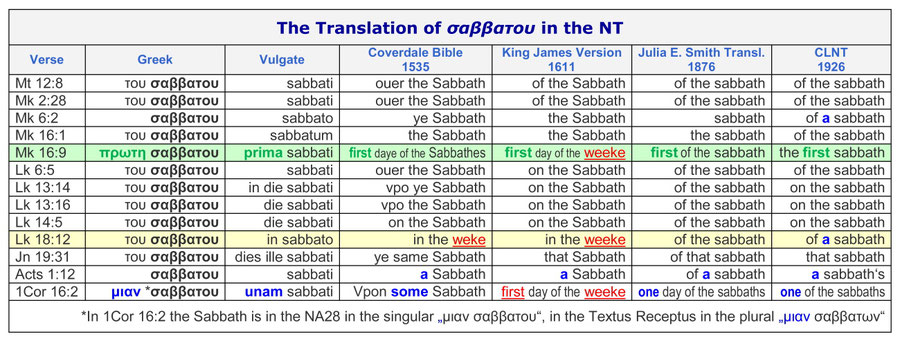
The free Bible program ISA3 (Scripture4All, Link) shows the literal translation and grammar, including the Concordant Literal New Testament (CLNT 1926, CLV = complete Bible):

Literally it means "early first Sabbath", the additionally inserted words "to" and "of" were added for better understanding, but this way rather the opposite is achieved. The German Bibles are particularly accurate because they often mention the appropriate word for the singular genitive "σαββατου" in their own language. However, following are some examples from English Bibles:
Douay-R 1582: And he rising early the first of the Sabboth, appeared first to Marie…
YLT 1862: And he, having risen in the morning of the first of the sabbaths did appear first…
SLT 1876: And having risen early the first of the sabbath, he was manifested first to Mary…
WAS 1904: And, having risen early on the first day of a sabbath, He appeared first to Mary...
CLNT 1926: Now, rising in the morning in the first sabbath, He appeared first to Mary...
KIT-W 1985: [Having stood up but early to the first (day) of sabbath he appeared first to Mary…]
LITV 1985: And having risen early on the first of the sabbath, He first appeared to Mary...
ERRB 1992: Having risen early the morning of the first of the shabbaths, he manifested first to Miryam...
ECB 1994: Having risen early the morning of the first shabbaths, he first manifests himself to Miryam...
MKJV 1998: And when Jesus had risen early the first day of the Sabbath, He appeared first to Mary...
JB2000: Now as Jesus rose early the first of the sabbaths, he appeared first to Mary...
ABP 2003: And having risen in the morning on the first day of the Sabbath, he appeared first to Mary...
KJ3 2005: And having risen early on the first of the sabbath, He first appeared to Mary...
MYLT 2005: And He, having risen in the morning of the first of the sabbaths, did appear first to Mary...
COLR-E 2007: Now after He had risen early from the dead on the first of the Shabbat, He first appeared to Miriam...
KataB 2007: upon STAND-UP/AGAIN-ing Yet early first sabbath he/she/it-was-APPEAR-ed foremost; first M…
ANT 2009: …but early [on] [one] first [of] break (weekly) [He] is shown firstly [to] mary...
CPDV 2009: But he, rising early on the first Sabbath, appeared first to Mary...
JMNT 2009: Now arising early in the morning, in the first (part) of (the) sabbath, He (later) appeared first to M...
Scr4All 2010: UP-STANDing YET to-morning BEFORE-most (=to-first-day) OF- SABBATH He-APPEARed to-MARY...
MISB 2011: Now after he had risen early on the first sabbath, he first appeared to Miriam...
ToY 2012: In the morning of the first of the Sabbaths, after He had risen, He appeared first…
GNM 2017: [And rising early on the first Sabbath, he was seen first by Miryam…]
Although all this is so easy to understand, most churches and pastors think that the women came to the tomb "on a Sunday" morning. They don't believe the literal statements of Jesus Christ and the evangelists (=the Bible), but they prefer to believe the statements of people: the catholic popes (Catholics, Evangelicals, Free Churches...), Ellen White (Adventists), Charles Russell (Jehovah's Witnesses) and Herbert W. Armstrong (Church of God with many splinter groups), because they want the Sunday, which was not mentioned even once in the whole Bible. The glorification of Sunday is pagan. They all make Jesus a liar because they believe their religious church leaders more than Jesus and they all deny the sign of the Messiah (This means: "3 days and 3 nights"), the most important sign in the history of the universe. Do you also deny this sign?
The Google Translation Confirms the Sabbath (Saturday)
The Google translation program does not speak of the Sabbath, because in the modern Greek language Saturday (Σάββατο) sounds very similar. However, it is always called "Saturday" and not "Sunday".
Just as every person can say "early on the first Sunday in Advent", so everyone can say: "early on the first Sabbath" until Pentecost. Mark wrote to the whole world: "πρωι (early) πρωτη (first) σαββατου (Sabbath)." He did not mention "after the Sabbath" and he also never spoke of "the first day of the week" (πρωτη ημερα της εβδομαδας).
God spoke of the "first Sabbath" (πρωτη σαββατου) in the singular and not of "on the first of the Sabbaths" (την πρωτη των σαββατων) in plural. This phrase is still found in the Greek language to this day. And even that does not mean today "on the first day of the week", "on a Sunday" or "after a Sabbath." If God uses the words "prote" and "sabbatou" (genitive singular), then we do not have the right to falsify His word, but we must translate it as God meant it.
The DeepL Translation Confirms the Sabbath (Saturday)
The free internet translation programme from DeepL is even more accurate. It proves how easy the Greek text is to understand. But in order to know what is meant by the „first Sabbath“ at all, God's calendar must of course be known:
What is the „first Sabbath“?
All Christians of the first early church knew exactly what was meant by this. It is the "first weekly Sabbath" AFTER Passover, after the first "High Sabbath" (15th Nisan). According to Lev 23:15-16 it is at the same time also the first weekly Sabbath of a series of seven Sabbaths, which were counted until Pentecost:
Lev 23:15-16: "And ye shall count unto you from the morrow after the sabbath, from the day that ye brought the sheaf of the wave offering; seven sabbaths shall be complete: 16 Even unto the morrow after the seventh sabbath shall ye number fifty days; and ye shall offer a new meat offering unto the Lord" (KJV).

So if there is a "seventh Sabbath" (or the "last Sabbath"), then there must of course also be a "first Sabbath" and a "second Sabbath" and so on. So the phrase mentioned by Mark, "early on the first Sabbath" (Mk 16:9) has been understood by every Jewish and Christian child of the first Christian congregation. Today, on the other hand, very few Christians know this saying, because they reject the Old Testament and do not want to know anything about a calendar of God. Mark has intentionally described it so "foolproof", on which day Jesus had risen, so that NOBODY can come up with Sunday, the holiday of the murderers of Jesus. According to Leviticus 23 there always had to be counted exactly 7 Sabbaths (which can be found in every Jewish and biblical calendar) and where there is the "7th Sabbath", there must of course also be the "1st Sabbath", "2nd Sabbath" and "3rd Sabbath" and so on. Mark could not have expressed it more clearly. Try it once yourself, it does not go clearer. If Jesus had been resurrected a week later, Mark would have written that Jesus was resurrected „early on the second Sabbath“ in the dative or in the genitive, which was often used in ancient Greek. You can't make it "second Sunday" either.
In any Jewish calendar, these 7 Sabbaths up to Pentecost can be determined with a Gregorian date. Here is an example from the years in which the 14th of Nisan fell on a Wednesday in the Jewish calendar:
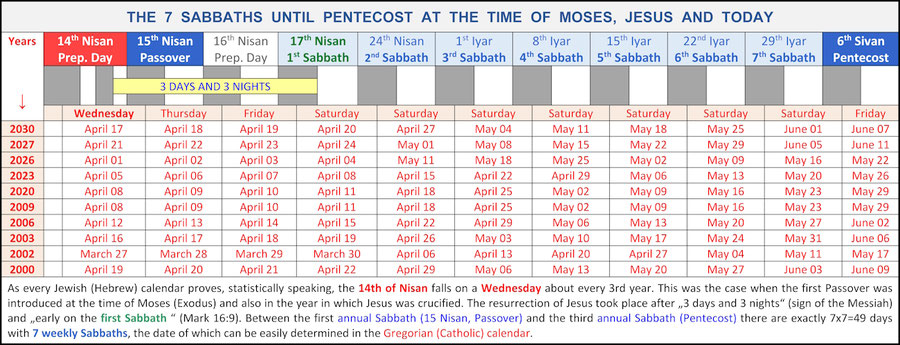
Mark could have used the plural sabbata (σαββατων, sabbton) in Mark 16:9 instead of the singular (σαββατου, sabbatou), that is, "early of the first of the Sabbaths" (in the genitive or in the dative; unfortunately, the English language does not distinguish here). The plural is the most normal thing in the world in Greek, because sabbata is a foreign word adopted from Hebrew, but words with an "a" at the end are considered plural in ancient Greek according to specific language rules, although strictly speaking they are singular. And this is not new, it was even in the Septuagint, 200 years before the Lord Jesus was born. And do you know how there in the 10 Commandments "remember the sabbath day“ (or more accurately, "to remember is the day of the sabbath"; in the singular genitive) was translated? It was in the plural genitive: "remember the day of the sabbaths (των σαββατων = plural!, not singular genitive σαββατου)." So Mark can write "early on the first Sabbath" (singular) or „early on the first of the Sabbaths" (plural). Any child can understand this is not a Sunday. Mark can express it in the dative or just in the genitive „early on the first Sabbath“ (σαββατου) because the genitive case was often used in ancient Greek. Both are correct. It is so easy to understand all this in any language, especially in German, because German also knows the genitive case; on the other hand, in English, which is very simple, the genitive case does not exist. Therefore, it is more difficult for the English and Americans to understand the ancient Greek and some parts seem illogical to them at first sight, which are all very logical to Greeks and Germans. The NT is about the "first Sabbath“ and not about the "first Sunday" and also not about the "first day of the week", because there are completely different Greek words for that (see the list of possibilities). One can translate without problems from the old Greek into the German and again back and it comes out after 100 translations always the same. But in English this is not possible. So Mark already makes it clear in Mark 16:2 that Jesus was resurrected „on the one/first of the Sabbaths“ and according to Mark 16:9 that was "early on the first Sabbath“. What is difficult to understand about this?
Just as the "first / second ... Advent Sunday", there is also the "first / second ... Sabbath" until Pentecost. In other words: Just as there is the "first Sunday of Advent" (or first Sunday after Passover, Nisan 15), so there is the "first Sabbath" (Mk 16:9) or the "first of the [seven] Sabbaths" until Pentecost. What is difficult to understand about this? If Christians had followed the calendar of God, they would have known exactly how the Bible and the Jews count the seven Sabbaths. In other words: The sabbath resurrection is not difficult but extremely easy to understand, but only if you know the calendar of God and what is meant in the Greek text "on the one of the Sabbaths" or "on the first of the Sabbaths" or "early on the first Sabbath" (Mk 16:9). This always meant the first of the 7 Sabbaths between Passover and Pentecost, which can be seen in every Jewish calendar. If the Bible would say, "the women came to the tomb on the first Sunday of Advent," then everyone would understand, because this "first Sunday of Advent" only comes once a year. In the same way, everyone in the first Christian church understood what the "first Sabbath" was, because it also existed only once a year. This was and is the first of a series of seven weekly Sabbaths that have been counted for 3,500 years between Passover and Pentecost to the present day and are seen in every Jewish calendar. All the first Christians knew God's calendar perfectly because they all came from Judaism. All have counted the seven weekly Sabbaths correctly (see counting the Omer). This is why the evangelists were so clear in the resurrection chapter of the NT and mentioned this particular Sabbath seven (7) times to avoid misunderstandings. All this is so simple to understand that it is again too complicated for the theologians who think that it can just NOT be so simple that God can express himself so clearly and distinctly and that God speaks really seven times of the Sabbath for they desire the Sunday.
In other words: If people do not know the calendar of God described exactly in the Bible (that was of course also the calendar of Jesus Christ and the Hebrew calendar) and orientate themselves only on the Catholic calendar of the Pope (who dared to change the calculation of time and the feast days), then they cannot possibly understand all this. But for us it is very easy to understand, because we know the calendar from our God, His definition of time and His calculation of feast days. It is not about the "first Sunday of Easter", no, but about the "first weekly Sabbath of Passover“. This, according to Leviticus 23, is the "first Sabbath" (not the "first Sunday") in a series of exactly seven Sabbaths (not "seven Sundays") between Passover (15th of Nisan) and Pentecost (50th day after Passover). All Jewish calendars show these seven weekly Sabbaths with this very important and unique "first Sabbath". This is "the one Sabbath" or "the one of the Sabbaths" (Mk 16:2; Lk 24:1, Jn 20:1) between the two High Sabbaths on the 15th and 21st of Nisan that border the Passover and the Days of Unleavened Bread. And this is the "first of the Sabbaths" or the "first Sabbath" of a series of the seven weekly Sabbaths that the people of God had to count each year until the so-called "Feast of Weeks" (Shavuot). Also the word "Pentecost" derived from the Greek (πεντηκοστὴ ἡμέρα = pentekoste hemera = fiftieth day) shows quite clearly that it must be a period of 7x7+1=50 days, that is, seven weeks with exactly seven weekly Sabbaths. Is this not all very simple to understand? What should be complicated about it? So far, no one has been able to find in the basic Greek text of the NT a "Sunday" or the "first Sunday" of a series of seven Sundays until Pentecost, because the Bible speaks of the "first Sabbath" and counts from the Passover (whose Hebrew name is derived from "to pass by" or "to spare") and never from the Easter (whose Germanic name is derived from the love and fertility goddess Eostra, resp. previously derived from the Phoenician Astarte or Ostarte, who was often depicted with large breasts and corresponds to the Babylonian Ishtar). God, Jesus and the Hebrews count these Sabbaths after Passover, but the Pope and most pastors prefer to count the Sundays after Easter. Who should we obey more, God or men?
There are two "first Sabbaths" at Passover. The 15th Nisan is the "first Sabbath" of the Feast of Unleavened Bread and is also the first High Sabbath of the year. Then follows the "second Sabbath" (this is a weekly Sabbath) of the Passover Festival and the 21st Nisan (Feast Sabbath) is the "third Sabbath" of the Feast of Unleavened Bread and also the second High Sabbath of the year.

However, the "first Sabbath" AFTER the first High Sabbath (15th Nisan) is always the "first Sabbath" of a series of exactly seven weekly Sabbaths between Passover (15th Nisan) until Pentecost. That is why it has been given this name. Then the "second Sabbath" follows a week later, then again a week later the „third Sabbath“ and so on. So if someone said "on the first Sabbath" or "on the third Sabbath", all Jews and Christians knew exactly which Sabbath was meant, because this Sabbath only existed once a year. The "first Sabbath" has always been clearly defined as the first weekly Sabbath after the High Sabbath (Passover-Sabbath, 15th of Nisan).

The Palm Sabbath, the 14th of Nisan on Wednesday and the „first Sabbath“ in 2023
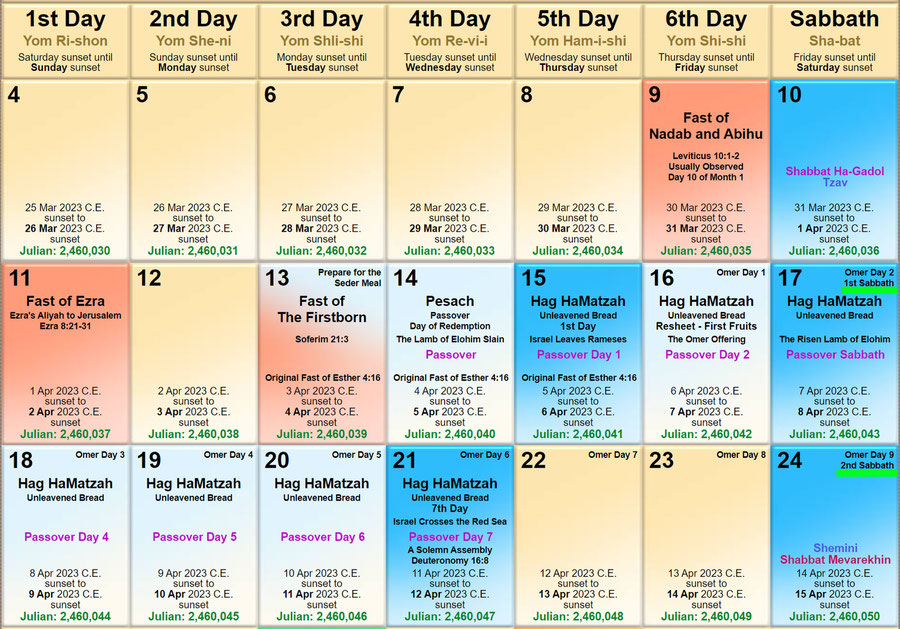
The year 2023 in God's calendar: Again (as can be seen about every 3 years in every Jewish calendar) the 10th of Nisan falls on a Sabbath which the Israelites call "Shabbat Ha-Gadol" (the great Sabbath). It is the Palm Sabbath, which most Christians do not know at all, because they orientate themselves only after the time calculation of the Pope and have no interest in the biblical and astronomical calendar of God. The 14th of Nisan (preparation day) falls on a Wednesday, the 15th Nisan (High Sabbath) on a Thursday and the 17th Nisan on the "first Sabbath" (April 7/8, 2023). The "second Sabbath" in the counting of the 7 Sabbaths until Pentecost is on the 24th of Nisan (April 14/15). Here the "first Sabbath" and the „second Sabbath“ are clearly recognizable and the 7 Sabbaths until Pentecost can be described by every Christian and every Israelite with Gregorian date. In the inaccurate Jewish calendar, which is offered for free on many websites, there is the same sequence in 2023, because both calendars fall on the same days in 2023.
Source of the illustration: TorahCalendar.
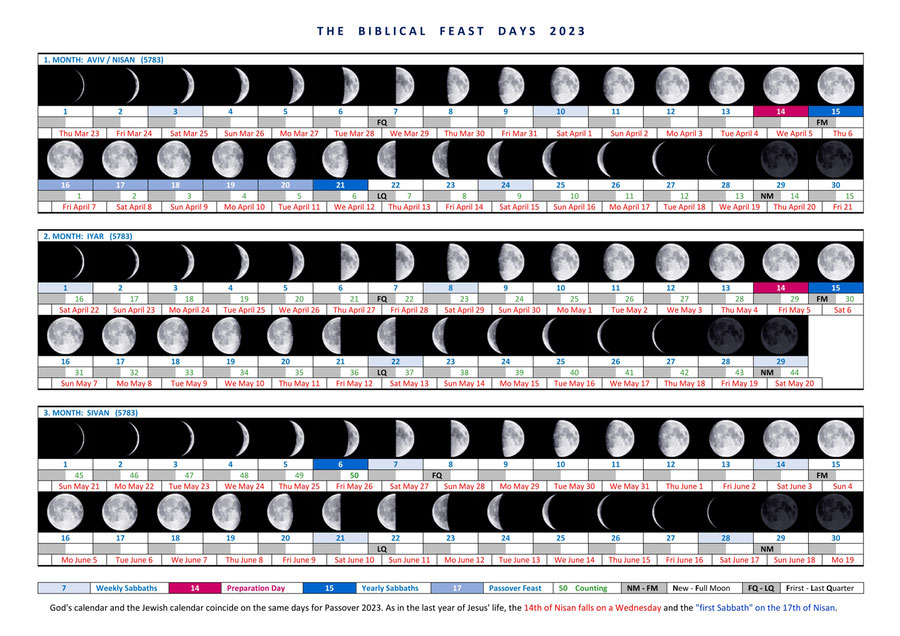
The same way of counting and naming still exists today according to the Jewish calendar and exactly the same order of days as in the year of Jesus' death existed in the years 1972, 1975, 1979, 1982, 1986, 1989, 1996, 1999, 2000, 2002, 2003, 2006, 2009, 2020 and 2023. Also in the future there will be exactly the same sequence of days to Passover as in the time of Jesus, in the years 2026, 2027 and 2030 (see first image above). Then the 14th Nisan will fall on a Wednesday and the "first Sabbath" on the 17th Nisan, the day of the resurrection of Jesus Christ. In 2020 there was exactly the same sequence of days at the Passover as in the year Jesus was crucified:


The Jewish calendar 2020 shows the counting of the Omer with the seven Sabbaths between Passover (15th of Nisan) and Pentecost. This year, God's calendar fell on exactly the same days as the Jewish calendar (see calendar). Since the 15th Nisan can fall on different days of the week from year to year, the 50th day (Pentecost) also falls on different days of the week (see table Omer counting). The 50th day after the seventh Sabbath is therefore not automatically a Sunday, but varies from year to year. That is why counting is necessary; otherwise God could simply have declared a particular day of the third month to be the day of Pentecost, and counting the 50th day after the seventh Sabbath would be superfluous. What is important is that for 3,500 years there have always been seven weekly Sabbaths (Saturdays) between Passover and Pentecost. But the year 2020 was special because it had the same sequence of days at Passover as at the Exodus from Egypt and as in the year Jesus was crucified.
Jesus' last Passover and the Passover of 2023. Again, Nisan 14 fell on a Wednesday in the biblical and Jewish calendar, and the "first Sabbath" fell on the 17th of Nisan. Consequently, the sequence of days in 2023 was the same as in the year of Jesus' crucifixion. The illustration on the right shows the counting of the 7 weekly Sabbaths, which can be seen in any online Jewish calendar.
Below are the two compared examples from the years 2000 / 2020, in which the 14th Nisan fell on a Wednesday, the 15th Nisan on a Thursday and the "first Sabbath" or "first of the Sabbaths" on a 17th Nisan. The dark blue fields show the three Sabbaths of the year (15th, 21st Nisan and Pentecost). On the right side the 7 weekly Sabbaths until Pentecost are listed. The numbers marked in green show the conting of the Omer, i.e. the 49+1=50 days:
Passover 2023 compared to the last Passover of Jesus
In 2023, the exact biblical and astronomical calendar of God and the imprecise mathematical (based on statistical averages) Jewish calendar fell on the same days. Thus, the same sequence of days can be seen in any online calendar. This is not secret insider knowledge, but absolute biblical principles, because the 14th of Nisan falls on a Wednesday approximately every third year, which means that the "first Sabbath" always falls on the 17th of Nisan. The following illustrations show the comparison between the last Passover of Jesus and the Passover in 2023 with the same sequence of weekdays including the Catholic (Gregorian) date:



The crucifixion and resurrection of Jesus lies exactly in the middle of the 12-day festival period, which begins with the setting apart of the lamb on the 10th of Nisan and ends on the 21th of Nisan (the end of Passover feast). There are 7 days from the 10th of Nisan to the "first Sabbath".
Between the separation of the Lamb on the 10th of Nisan and the resurrection of Jesus on the 17th of Nisan lie the 7 days that became the most important in the history of mankind. On the one hand, Jesus proved to the entire visible and invisible (spiritual) world through His sign (3 days and 3 nights) that he is the only Messiah (anointed one of God), and on the other hand, through the resurrection on His day, He fulfilled the meaning of the Sabbath and became our eternal Sabbath rest.
The worst translation error in the history of mankind
The translation of the singular Sabbath (σαββατου) into week (εβδομαδα), Lord's day (κυριακη) or Sunday (ηλίου ημερα) is one of the greatest translation errors in the history of mankind, because the original Greek text (Mark 16:9) concerns a single Sabbath (σαββατου) in the singular! It is never about a "week", i.e. a period of seven days (definition), and certainly not about a Sunday, a day that the Jews were not even allowed to pronounce, as it was dedicated to pagan gods. Sunday is also not the first day of the biblical week, as it begins at midnight, but all biblical days begin at sunset. Therefore the mention of the word "Sunday" in the NT is always wrong.
According to the Jewish calendar, Omer counting (see Omer) ALWAYS begins "on the day after the [High Feast] Sabbath" (15th Nisan), that is, on the 16th of Nisan (first day of Omer counting) and includes the seven weekly Sabbaths until the "Feast of Weeks" (Pentecost, the 50th day). So the phrase "on the first of the Sabbaths" or "on the first Sabbath" (Mark 16:9) never meant "on the first day of the week" or "on the first of the Sundays" or even "on a Sunday", but always only the first of the seven (7) Sabbaths between Passover (15th Nisan) and Pentecost, all of which have an exact date.
Whoever inserts "week" or "Sunday" in Mk 16:9 deceives Christians about the true content of the Bible and becomes a deceiver of Christianity. If God had meant the "week" or "Sunday", he would have had it written down. Instead, he mentioned the word "Sabbath" seven times in the resurrection chapter, so that we do not think of any other resurrection day. Satan hates the Sabbath and he wants to replace it with another day. The Bible is written for simple people and they understand it, but the "studied theologians" often do not understand it because they bring in their desired church teachings and so have to reinterpret everything in a complicated and confusing way. Whoever has a different opinion should simply translate the English words "early first Sabbath" or "early on the first Sabbath" into Ancient Greek. He will then realize that he has only one possibility to do so, namely the one that Mark also used. How then can he claim that a renewed translation of his own words into English should now suddenly mean "early on the first day of the week" or "early on Sunday"?
The apostle Mark was fully aware of the meaning of his words and he knew exactly what he was writing and what he was not writing. In his own idioms he could have spoken of a different day each time if he had wanted to, as two examples prove:
- "First Sabbath" instead of "first day of the week": In Mark 14:12 he uses the expression "τη (on) πρωτη (first) ημερα (day) των (of the) αζυμων (unleavened bread)". He could have simply taken his own sentence and replaced the "unleavened bread" with the "week" (εβδομαδας), and we would have the Sunday resurrection of Jesus. But instead he talks about "πρωτη (first) σαββατου (Sabbaths)" in singular genitive. Mark does not speak of the "first day of the week", but of the "last day of the week", i.e. the "first Sabbath". Why did he speak here of the first (prote) and not of a (mia) Sabbath? Answer: So that we don't have problems understanding, don't argue, and don't even have the idea that another day could be possible. Mark used the exact name of this weekly Sabbath, the "first Sabbath" after the Passover Sabbath (15. Nisan), the "first Sabbath" of a series of the seven weekly Sabbaths until Pentecost. It is also the "first weekly Sabbath" of the entire annual feast period, which started on Passover (15th Nisan) ends after the Feast of Tabernacles (22th Tishrei).
- "On the Sabbath" instead of "after the Sabbath": If Mark had meant "after the Sabbath", he would have told us, because he himself (!) uses the phrase "after the Sabbath" in Mk 16:1 (so only a few verses before), namely "διαγενομενου (when had passed) του (the) σαββατου (Sabbath)", The wording of the KJV: "And when the sabbath was past, Mary... had bought sweet spices..." But Mark did not want to say this in Mk 16:9, because he spoke of an event "on the first Sabbath" and not "after the first Sabbath".
The verses in Mark 16:9-20 belong to the Bible
The verses 9-20 in the 16th chapter of the Gospel of Mark are missing in some older Greek basic texts (Textus Sinaiticus, Textus Vaticanus), in which, however, other very important parts of the NT are also missing. Therefore, in some Bibles they are given only in square brackets [...], because some translators were not sure whether these verses belong to the Bible. However, in most Bibles worldwide these words are included, because almost all ancient Greek manuscripts were found with this content (Codex Alexandrinus, Codex Bezae, Textus Receptus, Majority Text). The important Vulgate (the Latin translation of the NT), which was the main Bible of Christianity for almost 1,300 years, also contains this passage. So it is not surprising that Bibles in various languages from before and after the Reformation also include Mark 16:9-20. These words have been the foundation of most Christian churches for the past nearly 2,000 years. So there is much more to be said for continuing to leave verses 9-20 in the Bible, not only because they are found in almost all ancient Greek manuscripts, but also because verse 8 makes no sense for a Gospel ending, since verse 8 reads:
„And they went out and fled from the tomb, for trembling and astonishment had seized them, and they said nothing to anyone, for they were afraid“ (Mk 16:8).
Should this trembling and fear be the end of a gospel, that is, of "good news"? Certainly not. Like the other gospels, Mark 16:20 ends with good news and confidence instead of fear:
„So then the Lord Jesus, after he had spoken to them, was taken up into heaven and sat down at the right hand of God. 20 And they went out and preached everywhere, while the Lord worked with them and confirmed the message by accompanying signs“ (Mk 16:19-20).
Furthermore, the "Sabbath" (sabbatou) mentioned in Mark 16:9 plays a major role in relation to the number symbolism of the Bible, because otherwise the NT would contain the "Sabbath" only 69 times (instead of 70 times) in the NT and only 6 times (instead of 7 times) in the resurrection chapter. Many Christians ignore the number meanings of the Bible, but God is a mathematician and the Bible is full of interesting number symbolism and many names contain important numerical values, the 888 (Jesus) or the 666. The 70 Sabbaths of the NT (7x10=70 is the number of perfection) and the 7 (number of completeness) Sabbaths in the resurrection chapter of the NT are accurately listed in the Interlinear Bible chapter.
Verse 9 is in no contradiction at all to the statements of the other evangelists Matthew, Luke and John, since these likewise all report unanimously and completely independently of each other about the resurrection of Jesus "on a Sabbath morning", literally: "on the one of the Sabbaths" (see mia ton sabbaton). And this can be after the High Sabbath (15th Nisan) of course only the following "first weekly Sabbath". It is the first of the seven (7) weekly Sabbaths which, according to Lev 23, have been counted for 3,500 years between Passover (15th Nisan) and Pentecost, and are found in every Jewish calendar to this day. Jesus rose from the dead after "3 days and 3 nights" (Mt 12:38-40, proofs), fulfilling the sign of the Messiah for the world. Jesus never spoke of 72 hours (see Church Opinions), but of His presence in the tomb being at least a portion of "3 days and 3 nights" (more info). This is all so extremely simple to understand, only the Catholic and Adventist theologians and the Jehovah's Witnesses make it all so complicated because they want Sunday in the Bible with all their might and for this they have to erase the Sabbath and twist Jesus' words to achieve this goal. If the statements of the Bible are not reinterpreted, a harmonious picture arises in which no biblical passage in the Gospels contradicts another:
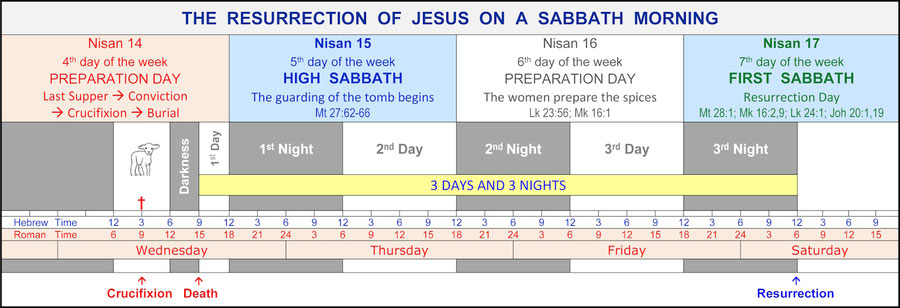
Many Christians deny the sign of the Messiah and talk about an alleged symbolic and meaningless saying of Jesus, just so they can celebrate their pagan Sunday. However, it is very interesting to note that many high-ranking Catholic personalities recognized by the Pope have translated correctly over many centuries, or copied the NT again and again. When the Latin translation of the NT (Vulgate) written by the Catholic "church father" Jerome (Hieronymus) appeared around 382 AD, Greek was still a common world and colloquial language, and not a foreign language that would have to be laboriously learned at university. Therefore it is all the more important to consider how Jerome translated the Gospels into Latin. He was a recognized and authorized language specialist, and for him (and thus also for the entire Catholic Church) the apparition of Jesus before Mary was according to the Bible NOT "on the first day of the week", NOT "on the day after the Sabbath", NOT "on a/first Sunday" and NOT "on the Lord's day", but: "on the first Sabbath" (prima sabbati). Every child understands this.
It is important to note that Jerome, with the word "sabbati", which appears frequently throughout the Latin Bible (OT and NT), always meant only the "Sabbath" and never another day or the week (see definition). He also used this 100% identical word "sabbati" to translate the Old Testament Shabbat in Exodus 20, when God proclaimed the Sabbath commandment. And no one can seriously claim that God meant Sunday here, or that he wanted the Jews to keep Sunday? Certainly not, for Sunday was never the last day of the week and never the holy day, but it was always the first day of the week on which work had to be done rather than rest. According to the translation of Jerome, Mark meant in Mk 16:9 exactly the same "sabbati" that is also mentioned in Exodus 20.
The German Ottheinrich Bible of 1430 translates quite excellently (translated):
"But since Jesus rose early on the first Sabbath, he appeared first to Mary Magdalene".
All 18 German pre-Lutheran Bibles correctly mention the "first Saturday" or the "first Sabbath".
The famous German catholic Mentelin 1466 wrote (translated):
"When Jesus rose early on the first Saturday, he appeared first to Mary".
Yes, that is the statement of the first worldwide printed Bible in a national language. Bible printing thus began with the proclamation of the Gospel that Jesus appeared to Mary "early on the first Saturday" [not Sunday] of the seven Saturdays until Pentecost (Shavuot). No one can deny this fact in the Catholic Bibles. But today's theologians are already taught during their studies to twist the statements of the Bible in accordance with church doctrine.

The Gothic Bible by Wulfila was written before the Latin and official catholic Vulgate, it also speaks of the "first Sabbath" (in the singular), what is difficult to understand about that? When the Gothic Bible (ca. 370 AD) and the Vulgate (383 AD) were written, ancient Greek (Koine) was still a world language, so no one can say that the translators allegedly did not understand what the Greek basic text was saying. Many old Catholic Bibles contained the Resurrection Sabbath, even the Douay-Rheims Bible 1582. Since the Reformation, the Sabbath (and Saturday) has been increasingly replaced in both Catholic and Protestant Bibles. Luther always spoke of a Sabbath in his 1522 translation of the New Testament, and this was also confirmed in the first official Catholic correction Bibles (the counter-bibles to Luther). However, as the Easter Sunday was always spoken of orally in church services, while the written text referred to a Sabbath, it was decided to adapt the Bible translations to Catholic teachings in order not to confuse the faithful and avoid uncomfortable questions.
The Protestant Geneva Bible 1599 and the King James Bible 1611 all follow the Catholic Easter Sunday doctrine and have replaced the "first Sabbath" (in the singular) with four new words (day of the week), which are not found in any Greek manuscript, i.e. not in the Textus Receptus and not in the Neste-Aland edition (NA28). This reveals the manipulation supported by many pastors around the world to justify the beloved Sunday rest while making the Sabbath a new preparation day for Sunday. Sunday is emotionally defended and any criticism is severely punished in some churches. However, nobody can answer the simple question: Why should God abolish and desecrate his own holy day (the Sabbath) and instead raise the weekly holiday of Jesus' murderers to a new global day of rest?

Every intelligent person on earth must realize that something cannot be right here. There cannot be two different resurrection days in the Word of God, where everyone can choose the one they want, depending on which Bible translation they take. No, there is only one biblical resurrection day (Sabbath) and one Catholic preferred day (Sunday), which most Christians want to have in order to avoid problems. In this way they show who they would rather follow and how little they really love God. He expressed himself extremely clearly and called the resurrection day by its name Sabbath 7 times (see interlinear bible). In every language of the world you can clearly express which day someone means and in Greek and Latin it is no different, these are extremely clear in their content. Anyone who falsifies the word of God and deceives the children of God is following other spirits, against whom the Bible warns.
How Adventists Twist the Word of Jesus and Seduce Christians
Seventh-day Adventists meticulously keep the Sabbath and threaten to be lost if other Christians do not keep the Sabbath. So it might be assumed that they are the ones who are especially committed to the literal translation of the basic Greek text and defend the biblical resurrection Sabbath. But it is just the opposite, they support the unbiblical Resurrection Sunday with all their might. And why? Because they believe a dead woman with visions more than the living Jesus Christ. That is the clear answer. Because Ellen White saw in a vision Jesus' dying on Friday and his resurrection "on a Sunday" (see quotes), Adventists support the Pope and the Catholic Church in spreading the false doctrine that Jesus was supposedly resurrected "on a Sunday." But what Adventists don't know: Many old Catholic Bibles speak of the women coming to the tomb "on a Saturday" morning or "on a Sabbath" morning. Martin Luther also translated correctly and speaks of Jesus appearing to the disciples "on the evening of the same Sabbath" (John 20:19, not „on the evening of the same Sunday“). These are all historical facts that are easy to understand (see German Manuscripts, German Bible Prints-1, Prints-2, English Manuscripts and English Bible Prints-1). The Adventists know very little about historical Bibles, therefore they do not know that there have always been and still are many Bibles worldwide that have been translated correctly. There cannot be two different resurrection days where everyone can pick one that they would like. The basic Greek text cannot mean two days at the same time and three short clearly defined words "mia ton sabbaton" cannot give 20 contradictory statements (see examples). So the Adventists use exactly the same arguments as the Pope, whom they even call an "antichrist" in some writings. Isn't that funny? Of all things, they defend his holiday with all their might as the alleged resurrection day of Jesus, thus giving this day a very special honor, because many keep Sunday only because on it the Lord supposedly rose from the dead.
Since the Adventists do not know God's calendar and read in Mark 16:1 that the women prepared the ointments „when the Sabbath was past“, they also cannot know that there is not only one but even three Sabbaths in each Passover week. Mark meant in verse 1 the preparation of the ointments after the high annual Sabbath (15th Nisan) and the coming of the women to the tomb "on a (little weekly) Sabbath," by which he meant the 17th Nisan in Mark 16:2. That is why in Mk 16,9 he clearly named this "one Sabbath" again with its name "first Sabbath" in the singular, so that we do not confuse it with the other Sabbaths at the Passover. This sequence of days exists very often in the Jewish calendar, namely statistically about every third year and there are no contradictions with all other Bible passages in the NT and this also harmonizes perfectly with the exact indication of Jesus, who spoke of "3 days and 3 nights" as the Sign of the Messiah. It really doesn't get any clearer than that. The table above shows the current years 2000 to 2030, in which the 14th of Nisan falls on a Wednesday and the 17th of Nisan on a Sabbath.
Many Adventists are sincere and truly want to walk in the way of God; the problem is church leadership adding other doctrines to the Bible and forcing believers not to question the teachings of the dead Ellen White, even when they contradict what the living Jesus said. Now everyone should think carefully about how God would have to express it in ancient Greek if he really meant the "first Sabbath"? What would He have to write differently? We call upon the church leaders, some of whom even claim to be "experts" in ancient Greek (Koine), to finally translate the following phrases from English into ancient Greek:
1. "(on) the one of the Sabbaths" (plural genitive)
2. "(on) the one of the Sundays" (plural genitive)
3. "(on) the first of the Sabbaths" (plural genitive)
4. "(on) the first of the Sundays" (plural genitive)
5. "early (on) the first Sabbath" (singular genitive)
6. "early (on) the first Sunday" (singular genitive)
7. "early (on) the first day of the week" (singular genitive)
For years, all Adventists have been running away from this task, knowing full well that for points 1 and 5 they have only one option for this, namely the one written in the ancient Greek NT: „μια των σαββατων“ and "πρωι πρωτη σαββατου“. It's all so simple. All the other phrases are not in the NT (see No Sunday).
The Adventists say (as does the Pope) that it would not sound logical to speak "of the first Sabbath,“ that makes no sense to them, and that it would be more logical if it said "on the first day of the week." Or they say that it could mean the "first day to the Sabbath“ (i.e. Sunday) or "second day to the Sabbath" (i.e. Monday). This is all great nonsense, for it is not so in any language. In the Greek basic text, moreover, the plural "sabbaton" is spoken of, so it should therefore be "on the first day to the Sabbaths", there is only right illogic. And the word "to" (or „in relation to“) is missing anyway, because it means „on the one of the Sabbaths“, just as every person can say "on the one of the Sundays in May". That's a big difference. It would be just as messy and confusing as if someone said today "on the first day to Sunday we will go to the movies." Who says such a crazy thing? In Israel, no one says that. In Israel, no one says that. We have contact with Jews and with Messianic Jews in Israel, some of whom even understand ancient Greek, and all of them independently confirm that such an illogical expression could only have been invented by Christians with a lack of knowledge of the Bible. In a pious way, the biblical Sabbath was to be replaced by the non-biblical Sunday. Therefore, they simply assert what the Jews are supposed to have always thought. This is wrong, because unlike these Christians, the Jews know what the "first Sabbath" and the "seventh Sabbath" are until Pentecost; they calculate this feast differently than the Adventists and Catholics. An important fact is: All Hebrew days have always had their own name and Sunday in Hebrew is simply called "day first" (Yom rishon, why didn't God say that in the NT, it would be so simple?) and not "the day first to the Sabbath/s", the Hebrew days of course starting at sunset and not midnight (see day). Also, the NT was not written in Hebrew, but in Greek. In the Greek NT, the word "day" is very often not mentioned, although it was meant, such as "on the third ["day" is missing] they threw the ship's tackle overboard with their own hands" (Acts 27:19). So God could have simply written "on the first day the women came to the tomb" or simply "on the first the women came to the tomb“, everyone would have no problems with that, so easy is the ancient Greek to understand, if theologians do not falsify it with new adventurous idioms and interpretations just to erase the Sabbath (in singular and plural) from the Bible. There were more than 24 ancient Greek phrases to describe a Sunday, see the chapter "No Sunday". And because it is not logical for the Adventists to speak of the "first Sabbath", because they do not know the calendar of God and have only heard about the 4 Sundays of Advent and the first Sunday of Advent of the pope, therefore finally a clarification from the Bible, which exposes the Adventist seductions:
Lev 23:15-16: "And ye shall count unto you from the morrow after the sabbath, from the day that ye brought the sheaf of the wave offering; seven sabbaths shall be complete: 16 Even unto the morrow after the seventh sabbath shall ye number fifty days; and ye shall offer a new meat offering unto the Lord" (KJV).

God (not us) commanded that 7 Sabbaths must be counted every year between Passover (15th Nisan) and Pentecost, not 7 Sundays. If there is a "seventh Sabbath", then there must also be a "first Sabbath“ and "second Sabbath", or must there not? This „first Sabbath" and "seventh Sabbath" exist only once a year, just as the Catholic "first Sunday of Adventv also exists only once a year. Every little child understands that. But only those who know the biblical calendar of God know that these 7 Sabbaths exist every year. They can be seen in every Jewish calendar and can be named exactly Gregorian date. The 14th of Nisan very often falls on a Wednesday (about every third year), then the "first Sabbath" is always on the 17th of Nisan. So it was in the year 2020. Mark and the other evangelists spoke of this "first Sabbath". And because this „one Sabbath,“ namely this very special „one little weekly Sabbath,“ lies between the two annual High Sabbaths (15th and 21st Nisan), it is called "the one of the Sabbaths" or "the first of the Sabbaths" or simply the "first Sabbath." If God meant the "first Sunday" of the several Sundays leading up to Pentecost, He would have said so. No one can express himself better than Jesus Christ, the Word of God and every Greek word in the NT has a clear meaning (see Interlinear Bible). For this there are not only the Strong-numbers, but numerous tools, which make a Bible work in the basic text very easy, like the free PC program ISA3 of Scripture4All, which is also available in German and Dutch and always speaks of one/first Sabbath in the Greek and English text.
The Adventists also cannot distinguish in the basic Greek text between the cardinal and the ordinal numbers (one/first) and throw everything into its pot (see one not first). Just as any language can say "on the one of the Sabbaths," ancient Greek could do this long before English even existed. And when the Vetus Latina and the Vulgate were written, ancient Greek (Koine) was still widely spoken and both the Vetus Latina and the Vulgate were well translated and speak of "one/a Sabbath" (una sabbati), see Bible passages. This, of course, the Catholic Church reinterpreted as the "Christian Sabbath", i.e. Sunday, so that people would not know about the biblical resurrection of Jesus and accept Sunday as a holiday. But just the very many old Catholic Bibles, which were translated excellently (see Old Bibles), show that also the Vulgate always meant only "a Sabbath“ and not „a Sunday“. If God had meant Sunday, He would have had more than 20 possible phrases in ancient Greek that he could have used (see no Sunday). Apparently, God is the only one who can never say "on one of the Sabbaths," "on the first of the Sabbaths," or "on the first Sabbath," even in no language of the world, because it is supposed to always mean "on one of the Sundays," "on a Sunday," "on the first Sunday," "on the first day of the week," or "on the day after the Sabbath"? How much effort Seventh-day Adventists put into deleting the Sabbath from the Bible. They should rather call themselves "First-day Adventists" or "Sunday Adventists", because they spread the doctrine of the alleged resurrection of Jesus on the pagan Sunday and thus give great pleasure to the Pope.
Because Adventists have little study of biblical numerical meanings, they do not know the structure of the Bible, nor do they know that in the entire NT the Sabbath was mentioned exactly 70 times and 7 times in the resurrection chapter (see enumeration). They replace 6 times (the number of man) the Greek Sabbath (sabbaton) in singular and plural by the week, although in all other places of the Bible and extra-biblical literature only the Sabbath is always meant and there has always been a separate word for the "week" in Greek (see week). Thus they destroy the numerical meaning that God put into the Bible. But since they also do not know the difference between the 7th day of the week Sabbath (see definition Sabbath) and the seven-day week (see definition week), they follow the teachings of the Pope and say that the "Sabbath" (literal meaning: to cease or rest) supposedly also means the "week" (literal meaning: sevenness, unity of seven). According to this, the whole week should probably be rested and the plural "sabbaton" (σαββατων, Sabbaths) should probably mean "weeks" in the plural or singular, however, the Sabbath in the singular must not be meant? How illogical and chaotic all this is. Apparently God is the only one who is not allowed to speak of the resurrection Sabbath, because the pope and the Adventists simply do not want it and prefer to have Sunday in the Bible.
Apparently the Word of God (Jesus) is the only one who can't find the right words and just confuses us because He supposedly doesn't know how "on a Sunday", "on the first day of the week" and "on the day after the Sabbath" means in ancient Greek (who supposedly doesn't know the Greek words "week" and "Sunday", which all Greeks have always known, see "week") and needs the Pope and the Adventists to tell Him what to mean, namely Sunday, the Roman holiday of the Roman murderers of Jesus? CERTAINLY NOT!!! The Word of God (Jesus) has been extremely clear and His children understand that. The Word of God speaks of the Sabbath 70 times in the NT and 7 times in the resurrection chapter. And the women prepared the ointments "after the Sabbath" (Mark 16:1) and came to the tomb „on the one of the Sabbaths“ (Mark 16:2). This apparent contradiction is understood by anyone who knows God's calendar, for after the Sabbath is before the Sabbath and for Passover there are even 3 Sabbaths within only 7 days. And the "first Sabbath" (Mark 16:9) is not the "first Sunday" until Pentecost and also not the „first day of the week“ and also not "the first day after the Sabbath". but it is the "first Sabbath" which has to be counted every year until Pentecost (Leviticus 23) and can be found in every Jewish calendar. Every child can understand this, except the theologians, because they want Sunday in the Bible. And when Jesus, the Word of God, speaks of "3 days and 3 nights" and of the "only sign", He does not mean a turbo resurrection in "1.5 days", just because that is what the Pope, a dead seer (Ellen White) and the Adventists want. Will the Sabbath save them when they have to answer to God in judgment for perverting the words of the Lord and deceiving Christians?
Also, the false argument that dead people were supposedly not allowed to be treated and anointed on a Sabbath, even the Pharisees did not come up with that. Jesus Christ personally called such lawful and unloving people people hypocrites; see the chapter "It was no sin to anoint dead people on a Sabbath."
We have had many discussions with Seventh-day Adventists and the discussions always follow the same pattern. The comments under videos on You Tube are deleted instead of refuted so that the Christians continue to remain under a veil of concealment. When Adventists run out of arguments and realize they are wrong, the insults follow with Matthew 23 (Jesus' complaint against the Pharisees) and threats of "unforgivable sin" because we dared to criticize Ellen White and do not accept her unbiblical spirit messages with additions to the Bible. Like the Catholic Church, Adventists work to spread the fear of damnation and unforgivable sin so that people will stay in their organization and not question anything dictated from above. Let this be told to you: you can scare little children, but not men of God who defend the Word of Jesus Christ (written down in the NT), which you twist. You defend the Pope. And when Jesus Christ as the Word of God says that He will be „3 days and 3 nights“ in the heart of the earth (see link), He does not mean your Catholic 1.5 days, but Jesus means "3 days and 3 nights". Did you understand that? This was the only sign of the Messiah, the most important sign in the history of the universe, which you deny and twist the words of the Lord and Messiah Jesus Christ. You better worry yourselves whether you are not rather committing the sin against the Holy Spirit, if you continue to twist and reinterpret the word of Jesus like this and want to seduce the children of God to the Catholic Resurrection Easter Sunday. Just as the Sabbath could not save the Pharisees, the Sabbath will not save you either if you do not stop twisting the word of our Lord Jesus Christ, proclaiming another Sunday gospel and thus seducing the children of God to another resurrection day, which was not mentioned by name (Sunday) even once in the entire Bible. The NT speaks 70 times of the Sabbath, which you want to erase from the Bible 6 times and replace it with the Pope's holiday. We ourselves fell for this deception for years until we checked the basic text and hundreds of new and historical Bibles in several languages. That is why we can understand others very well and can help them to get out of this grip of fear, to become free and to stop twisting the words of Jesus, but to defend them happily and courageously.
The Bible does not know another gospel of Sunday that erases the Sabbath from the Bible, but warns against it:
Gal 1:8-9: "But even if we or an angel from heaven should preach to you a gospel contrary to the one we preached to you, let him be accursed. 9 As we have said before, so now I say again: If anyone is preaching to you a gospel contrary to the one you received, let him be accursed."
Many pastors make it easy for themselves and say: "that with the resurrection day is not a question necessary for salvation". This is true, but it only applies to Christians who have been deceived by pastors; but for those who deliberately falsify the Word of God and deceive the children of God, it is very much a question that is necessary for salvation. The turbo resurrection of Jesus that many theologians and pastors wanted never happened, but rather He fulfilled the sign of the Messiah (3 days and 3 nights):
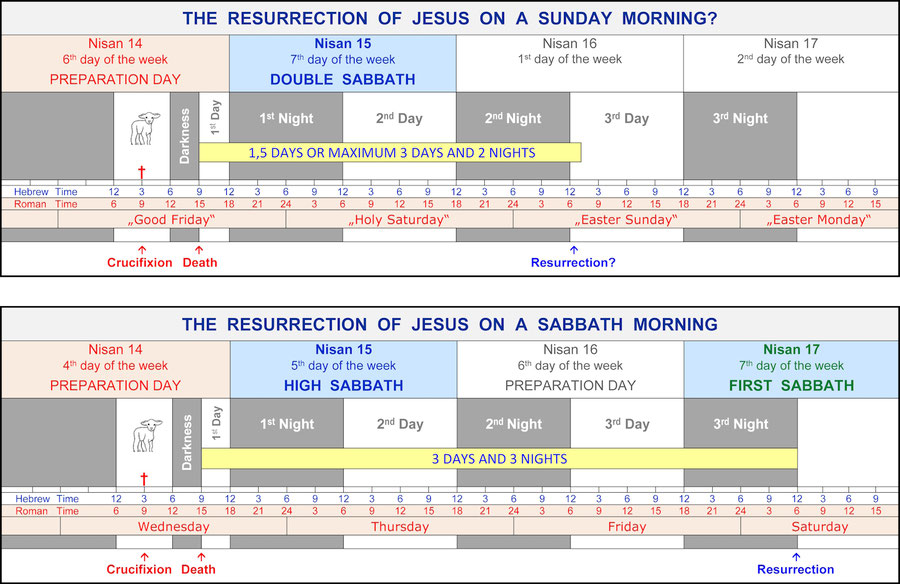
MANY BIBLES REVEAL THE RESURRECTION SABBATH
There are more than 150 Bible translations worldwide that report the coming of women to the tomb "on the first Saturday" or "on the first Sabbath". These include over 40 German Bibles, of which there are free facsimiles. The fact is: There are many more historical Bible translations worldwide that speak of the coming of women to the tomb "on the first Sabbath" than of coming "on a Sunday". Therefore we are not proclaiming a new doctrine, but ancient and early Christian basic knowledge. The theologians can tell the Sunday fairy tale to their little children, but not to us, because we know exactly what the evangelists have said in the Greek basic text; and we refer to the many correct historical and current Bible translations worldwide. There cannot be two resurrection days at the same time, but only one.
Besides the basic Greek text, there are many Bibles in many languages that teach the resurrection of Jesus on a morning of the "first Saturday" (Samstag, Sobota) or the "first Sabbath". The old German Bibles usually do not speak of the Sabbath (Sabbat), but of the Saturday (Samstag, Sonnabend) morning when Jesus appeared to Mary. For the list of abbreviations of the Bibles see link. The original copies of most Bibles can be downloaded as facsimiles from the Internet free of charge (see Historical Bibles).


Very many German Catholic and Protestant Bibles report that Jesus appeared to Mary "on the morning of the first Saturday" or "on the morning of the first Sabbath". For many centuries nothing was known in German Bibles about an alleged Sunday resurrection of Jesus, although the Church orally taught Sunday. These are historical facts which quite plainly prove that both the basic Greek text and the Latin Vulgate have always meant the "first Sabbath" and not the "first Sunday" of the seven Sabbaths between Passover (Nisan 15) and Pentecost (50th day).



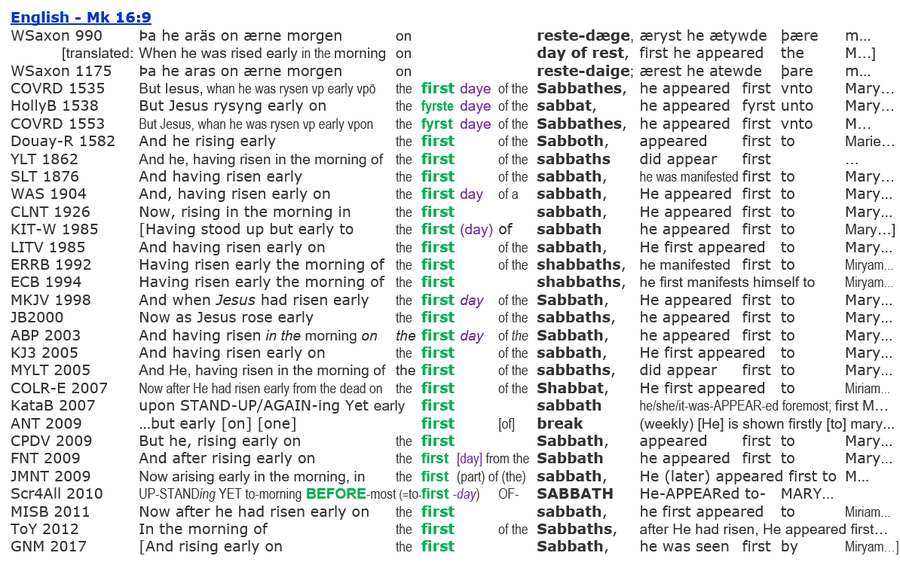

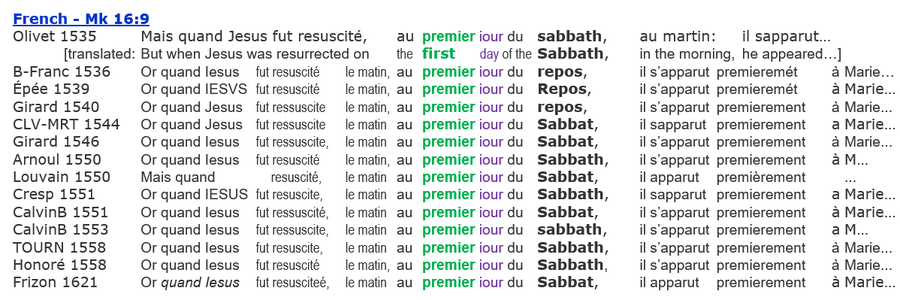







The resurrection of Jesus „on a Sabbath“ or „on a Saturday“
Mark speaks precisely of the "first Sabbath". He speaks of the genitive singular, so the translation is very simple and there is only one option. Nevertheless, there are also Bibles that speak of "on a Sabbath" or "on a Saturday". In terms of content, this is of course also correct. A Sabbath/Saturday is not a Sunday:

INCORRECT TRANSLATIONS WHICH ERASE THE SABBATH IN Mk 16:9
As can be clearly seen, over the centuries a chaos of translation has developed. It is absolutely impossible that the one Greek basic text offers two different resurrection days, where everybody can choose one. This diversity of the most different and contradictory translations makes it clear that we can speak of a deliberate falsification of the Word of God. The closer we get to the coming of Jesus Christ and the Rapture, the more Bibles dare to erase the Sabbath from the Bible and replace it with the word "Sunday". So far no human being has succeeded for 2,000 years in finding the corresponding Greek words for "after", "week", "Lord's day" and "Sunday" in the basic text of Mk 16:9.
And the reality is even worse, because some Bible programs even translate old correct German, Spanish, Italian, Swedish or Czech Bibles incorrectly (see old Bibles), because they now always turn "on a/first Sabbath/Saturday" or "on the one/first of the Sabbaths/Saturdays" into "on the first day of the week" or "on a Sunday". In concrete terms, this means that not only the statements of the ancient languages Greek and Latin are being falsified, but also those of the modern languages, where Bibles that have already been correctly translated into national languages are being falsified again. Apparently, you cannot speak of a Sabbath or Saturday in any language in the world because it supposedly always means "on the first day of the week" or "on a Sunday". This shows how demonic the whole thinking of some people is. They cannot be convinced by arguments, but want to see Sunday in the Bible with all their might and by force. They come up with the craziest arguments just to seduce the Bride of Christ and take her away from God's biblical calendar with its feast days to ancient pagan feast days that are not mentioned once in the entire Bible.
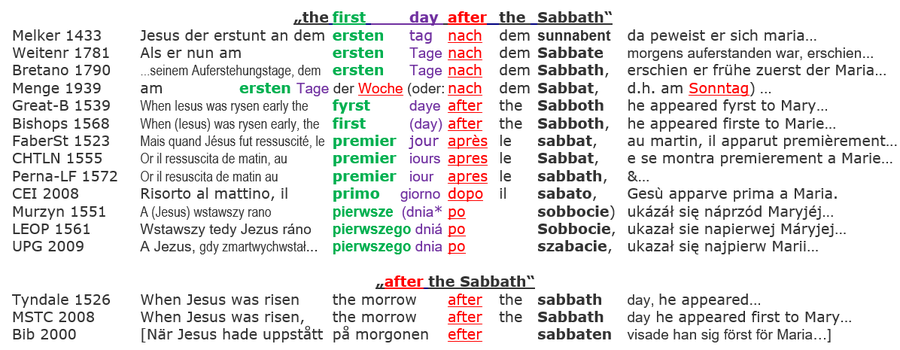
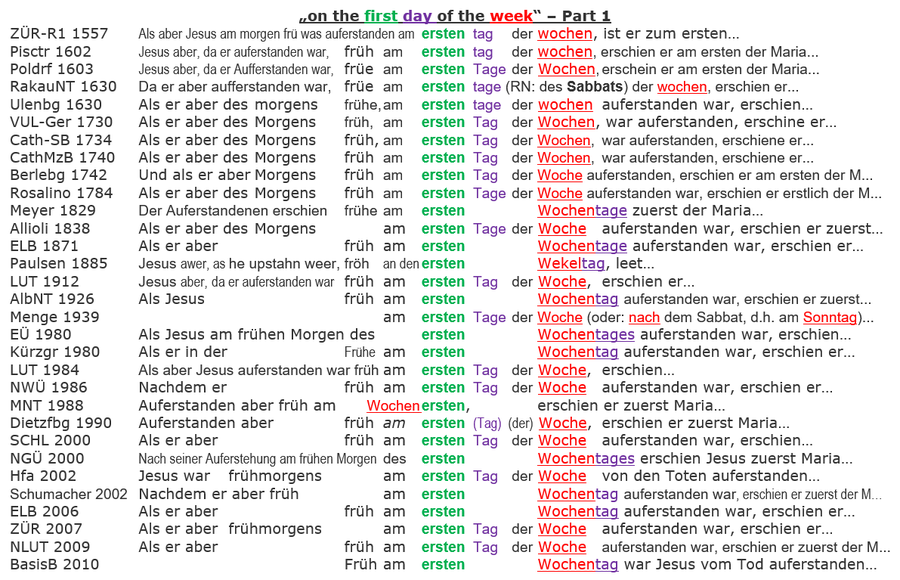

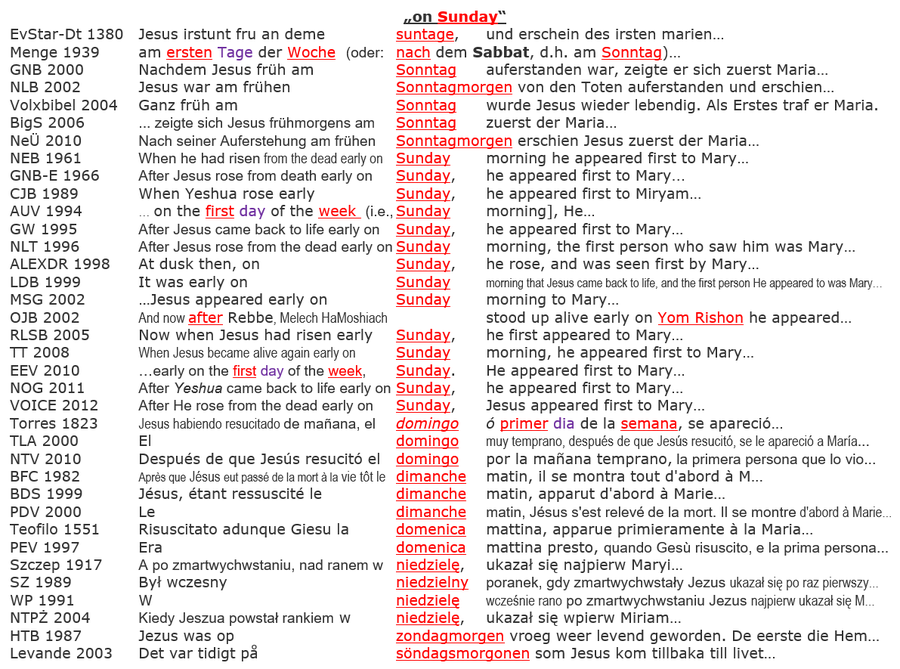
For the list of abbreviations of the Bibles see link. The original copies of most Bibles can
be downloaded as facsimiles from the Internet free of charge
(see Historical Bibles).
"Prove all things; hold fast that which is good. Abstain from all appearance of evil"
(1Thess 5:21-22)
"Take no part in the unfruitful works of darkness, but instead expose them"
(Epheser 5:11)

